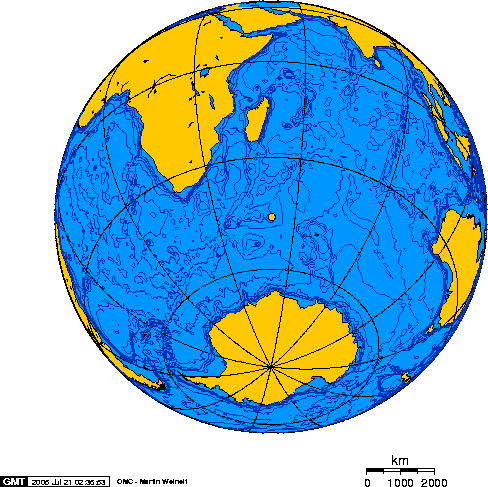In a previous post I shared with you a study projecting that the king penguin (Aptenodytes patagonicus), an upper-level predator in the southern polar ecosystem, would have to relocate en masse in the coming decades due to climate change. In a new study, a different team of scientists set out to analyse the largest known population of king penguins, living in Pig Island, part of the French Crozet Island archipelago in the subantarctic Indian Ocean. They found that this population has been reduced by 88% since 1982 (see table below).

Researchers had last visited the location in 1982 when a headcount estimated the Pig Island king penguin population to consist of around one million adults. It wasn't until 2016 that helicopter fly-overs revealed considerably lower numbers of the birds living in the remote island, prompting scientists to investigate further. Relying on satellite image data, the researchers were able to quantify the number of animals by the surface area they occupy (estimated to be 1.6 breeding pairs per square meter) finding that by 2017 the island was home to no more than 60,000 breeding pairs. The results were understandably considered to be "very depressing" by Dr. Henri Weimerskirch who participated in both the 1982 and the latest censuses.
The king penguin prefers ice-free sub-antarctic islands with sand or pebble beaches to rear its chicks and relies on a diet rich in fish and squid that is found along the Antarctic Convergence, a meeting of cold, northward-flowing Antarctic waters and warmer subantarctic waters. As the global climate warms, the Antarctic Convergence is expected to retreat further south, leaving the preferred nesting habitat of the birds too far away from their food supply (if they don't make the trip back within a week their chicks die of starvation). Other than more direct climate change effects, the authors also think that disease, the 1997 El Niño, and competition for resources may have all contributed to the observed decline in numbers (all of these factors can be affected by climate change too).
| Timepoint | Breeding pairs |
|---|---|
| Dec 1962 | 317,000 |
| Feb 1982 | 502,400 |
| Jan 1988 | 494,000 |
| Jan 2015 | 76,640 |
| Dec 2016 | 50,926 |
| Apr 2017 | 59,200 |
| Table 1 |
The team is planning to visit the island in 2019 to better assess the conditions on site, such as food supply, interactions with predators, or presence of parasites and disease. If this downwards trend continues, and is also happening in other king penguin populations, the species may very well soon find itself joining the other 16,000 endangered species so far catalogued by the International Union for Conservation of Nature (IUCN).
Original article
Further reading
"Largest king penguin colony in the world drops by 90%" at The New York Times
"Climate-driven range shifts of the king penguin in a fragmented ecosystem" at Nature Climate Change
This is a lot of detail, we need much more articles like this here on steemit
Hey, cool Post. Do you know about the @steemstem community? Maybe you should check it out.
Hi, yeah thanks, I've been meaning to join their discord for a while now, I'll probably do it soon!
the climate change is worrisome but much of the government does not seem to worry and the penguins are paying the consequence of this sudden change that is living our planet.
Yeah sadly world governments haven't done enough (mostly due to corporate interests) and we are all gonna pay (are paying already) the consequences.
This post was upvoted and resteemed by @resteemr! Thank you for using @resteemr.
Introduction of resteemr.@resteemr is a low price resteem service. Check what @resteemr can do for you.
Congratulations @tychoxi! You have completed the following achievement on Steemit and have been rewarded with new badge(s) :
Click on the badge to view your Board of Honor.
If you no longer want to receive notifications, reply to this comment with the word
STOP